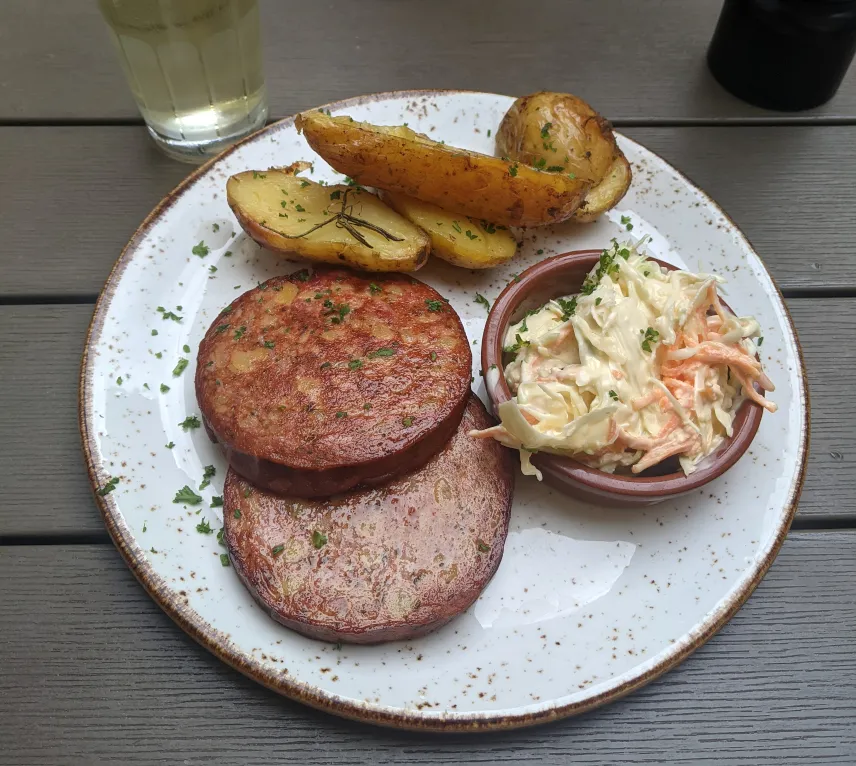
Mainz and Wiesbaden – Two Day Trips from Frankfurt!
TL;DR
Travel guide for your holidays in Wiesbaden, Hesse, including what to do in Wiesbaden, and Mainz, Rhineland Palatine, including what to do in Mainz. Two capitals, two day-trips from Frankfurt!
Spend 1 weekend in Mainz and Wiesbaden, Germany. Right next to each other, on opposite sites of the Rhein River, they are the perfect combination for a long weekend or simply two day trips from Frankfurt am Main.
We'll give you an itinerary introducing Mainz things to do as well as Wiesbaden things to do, a map to do a self-guided walking tour, and our favourite restaurant and bar options to make your holiday in this German region perfect.
Weekend trips from Frankfurt
Mainz or Wiesbaden?
The question of Wiesbaden vs Mainz is hard to settle.
Wiesbaden is the capital of the German Bundesland (or federal state) Hesse, Mainz is the capital of Rhineland-Palatinate. Hence, the atmosphere and food are quite different although they are less than a 30-minute drive apart.
We can't tell you which city is "better" or which city to chose if you only have one day. Yes, the centre of Wiesbaden is more optically pleasing because it was less destroyed during World War II and they have a long history of being a spa town behind them. But Mainz is closer to the River Rhein, which offers a great opportunity for some relaxing walks. We found nice restaurants and bars in both towns and the price level is similar. Visit both cities and decide for yourself which one you prefer!
By the way: They are both part of the same public transport system, the Rhein-Main-Verkehrsverbund (RMV).
How to get from Frankfurt to Wiesbaden by public transport
Frankfurt am Main with its big airport is the hub of the area. From there, it's quick, easy and cheap to take the S Bahn or regional train – the ride takes around 40 minutes and runs every 10 minutes during the day.
How to get from Frankfurt to Mainz by public transport
The same applies for Mainz: Take the S Bahn or regional train– the ride takes around 40 minutes and runs several times per hour during the day.
16 Things to do in Wiesbaden
Thermine Wiesbaden
1. Thermine
When you arrive in Wiesbaden, the historic trolley Thermine is a great way to get an overview of the city of Wiesbaden with its history and stories. They leave several times a day from Castle Square and the tour is also offered in English. You'll learn about Wiesbaden's history as a spa town, about some of its famous inhabitants (both historical and recent) and see the most famous sights.
2. Nerobergbahn
Hop off at the Nerobergbahn, Germany’s oldest water-powered funicular railway. The tramway is a sight in itself but there's also the Neroberg at the top with some amazing views over Wiesbaden.
3. Saint Elizabeth Church
Make your way to the Russian Orthodox Church of Saint Elizabeth with its amazing golden towers. Here, you can hop back on the train Thermine and finish the tour.
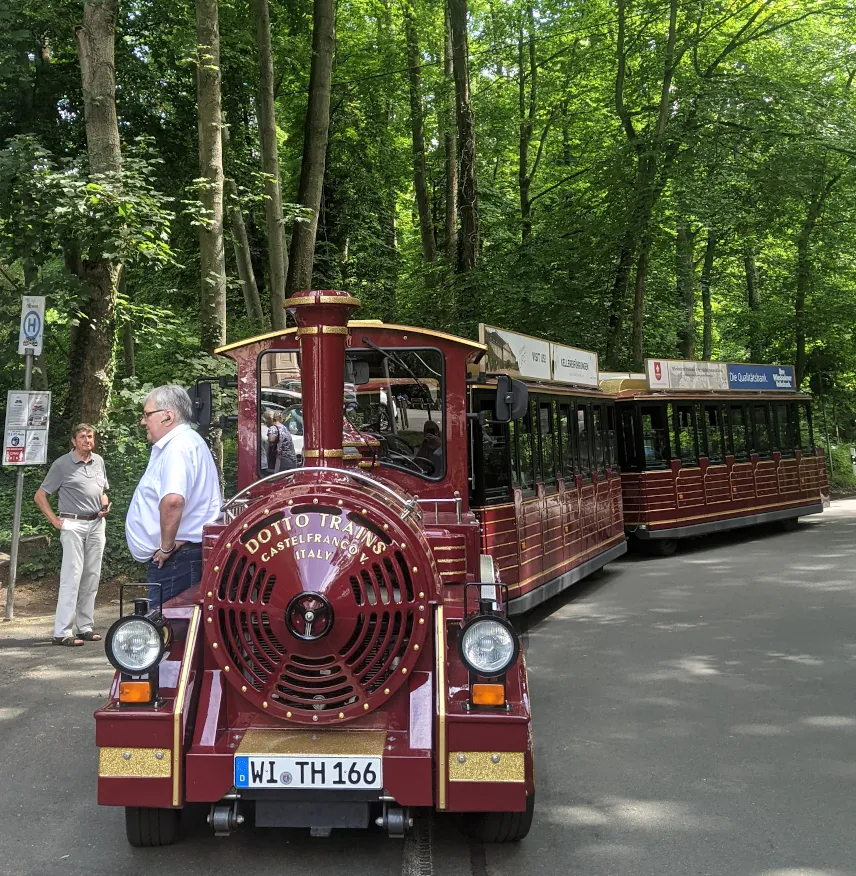
Wiesbaden Attractions Around the Kur or Spa Area
4. Bowling Green
You enter spa area via the Bowling Green, a nice green area with a fountain, lined with columns on both sides.
5. Kurhaus
Of course, it is a must to visit the Kurhaus or spa building itself. The interior is just splendid. It also houses the casino, which we didn't check out ourselves.
6. Hessisches Staatstheater
On the right side, you'll find the neo-baroque Hessisches Staatstheater, the theatre.
6. Kurpark
The Kurpark or spa park is behind the spa building. It features lakes, where you can rent boats, open green spaces and flowers on an area of 75.000 m² (810,000 square feet). In general, you'll find many lovely parks in Wiesbaden.
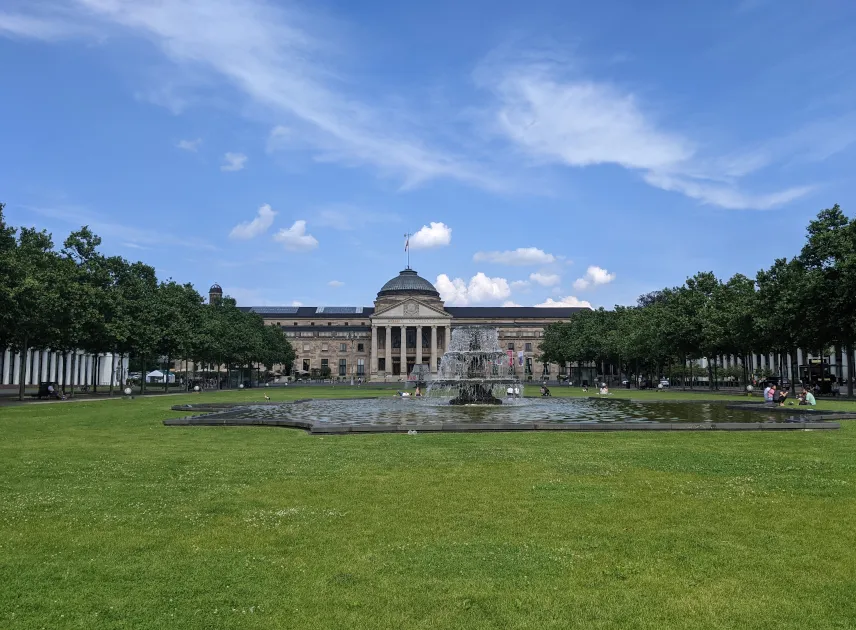
Places to Visit around the Schlossplatz or Castle Square Area
7. Marktkirche
Along Castle Square, you can find the neo-Gothic Marktkirche (Market Church).
8. Marktbrunnen
The Marktbrunnen (Market Fountain) was built in 1753 and shows Wiesbaden’s coat of arms.
9. Old Town Hall
The Old Town Hall is the oldest building in the city and was built between 1609 and 1610 as a Renaissance building.
10. New Town Hall
The New Town Hall was built between 1884 and 1887. The building was damaged in World War II and restored in a simplified form.
11. Wiesbaden City Palace
Additionally, there is the Wiesbaden City Palace with the Hessischer Landtag, the government of Hesse.
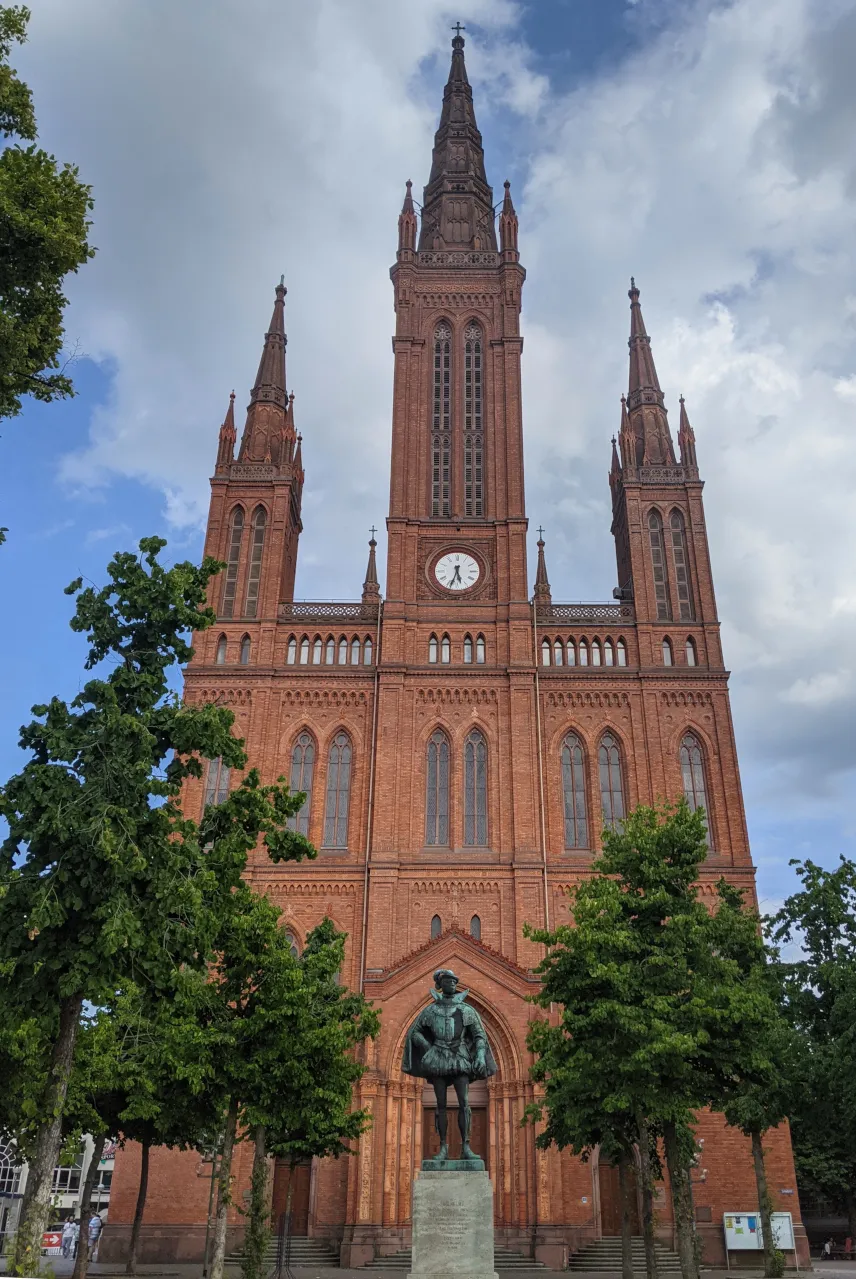
Other Things to See in Wiesbaden’s Centre
Other noteworthy mentions in Wiesbaden's city centre are:
12. Largest Cuckoo clock in the world
The largest Cuckoo clock in the world (technically the second largest, because they built a bigger one in the Black Forest).
13. Römertor
The Heidenmauer with the Römertor (Roman Gate) was built in 370 A.D. by the Romans.
14. Kochbrunnen
The Kochbrunnen (Boil Fountain), a sodium chloride hot spring with a water temperature of about 66 °C (151° F) – if you bring a cup you can taste this water (we thought it tasted like rusty saltwater 😅).
15. Wiesbaden Main Station
After Frankfurt, Wiesbaden has the second-largest railway station in Germany. The neo-baroque design was realised in red sandstone.

Things to do in Wiesbaden Outside of the City Centre
16. Biebrich Palace
Biebrich Palace is a bit outside the city centre next to the river Rhine. If you have the time, make sure to visit. The castle is a Baroque residence in the borough of Biebrich in the city of Wiesbaden. Built in 1702 by Prince Georg August Samuel of Nassau-Idstein, it served as the ducal residence for the independent Duchy of Nassau from 1816 until 1866.
Hesse food and drink
The most popular drink in Wiesbaden and all of Hesse is Apfelwein (apple wine). You can drink it pure or "gespritzt", either sour (with sparkling water) or sweet (with lemonade). Additionally, Wiesbaden is next to the Rheingau wine region. You should definitely taste some of their white wines like Riesling!
Famous dishes are Handkäs (hand cheese), a sour milk cheese (similar to Harzer) and Frankfurter Grüne Soße (green sauce) – a cold sauce with finely chopped herbs, served with eggs and potatoes.
We decided to try our traditional foods in the restaurant Bäckerbrunnen in the city centre. For drinks, Scotch 'N Soda is an excellent choice. We based ourselves in the Business Hostel Wiesbaden PRIME, which has a lovely rooftop terrace, where can bring your own drinks and enjoy a cheap nightcap!

16 Things to do in Mainz
Places to visit in Mainz along the River Rhein
1. Reduit with the Museum Castellum
Rather than taking the train to Mainz main station, it might be nice to drive to Mainz-Kastel. You can check out the old Reduit with the Museum Castellum and learn about 2000 years of history.
2. Theodor-Heuss-Bridge
Make your way over to the Theodor-Heuss-Bridge to the city centre of Mainz. You'll have great views over the Rhein and can see where the Main joins the Rhein in the distance.
3. Deutschhaus
On the other side of the bridge is the Deutschhaus, the seat of the Rhineland Palatinate Landtag, the government of Rhineland Palatinate.
4. Kurfürstliches Schloss
The Kurfürstliches Schloss (Electoral Palace) was the former city residence of the archbishops of Mainz.
5. Stroll, relax, beach bars
Of course, you can simply relax on the banks of the River Rhein – there are even some beach bars.
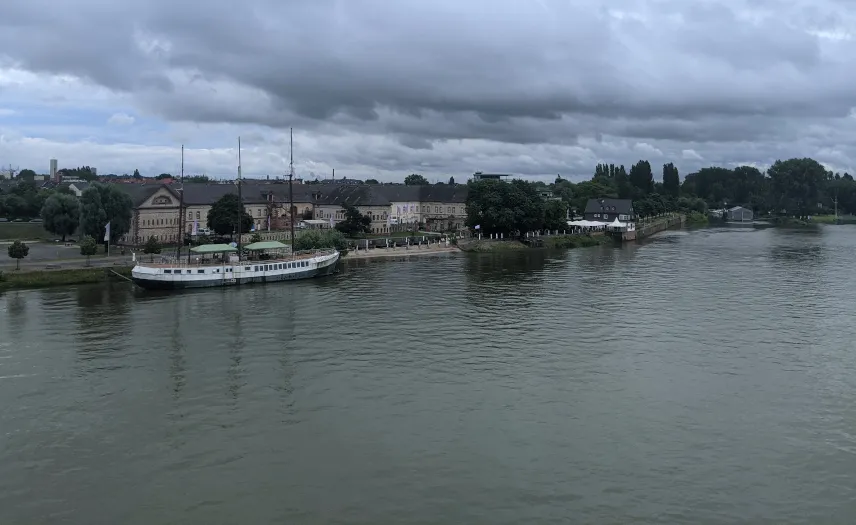
Mainz Attractions Around Market Square
6. Marktfrühstück
The highlight of the city centre is the market square. Make sure to come on a Tuesday, Friday or Saturday between 7 am and 2 pm to start your day in style. A big part of Mainz culture is the Marktfrühstück (market breakfast) with "Weck, Worscht und Woi" (buns, sausages and wine).
7. Market Square
Revitalized by the delicious food, you can explore the other highlights on the market square like the Marktbunnen (market fountain) and the Nagelsäule monument.
8. Mainz Cathedral
Another highlight is the Mainz Cathedral. During the Middle Ages, many German kings and queens were crowned here.

Things to see in Mainz: Roman Ruins
The cityscape of Mainz is rather odd. 2000 years of history are very visible with Roman ruins.
9. Isis Temple
The Isis temple underneath the Römerpassage.
10. Roman theatre
The Roman theatre was once the largest Roman stage theater north of the Alps. The theater offered space for about 10,000 visitors.
11. Drusenstein
The Drususstein in the Citadel.
Historic Areas
During World War II, 80 % of the city were destroyed by bombings. Therefore, the city centre is a mixture of modern and historic buildings. A beautiful historic area can be visited around the Ballplatz.
12. Älterer Dalberger Hof
The Älterer Dalberger Hof was the seat of the barons of Dalberg in Mainz until they moved to the younger Dalberger Hof in 1718.
13. Osteiner Hof
The Osteiner Hof in Mainz was built by Johann Valentin Thoman between 1747 and 1752 for the Elector of Mainz.
14. Marienkapelle
The Marienkapelle is a Gothic-style chapel in Mainz from the early 12th centrury.
Visit Mainz During Fastnacht or Carnival
Another big part of the Mainz culture is the carnival called Fastnacht. If you're not in town for this particular season, there are two places you can visit all year round:
15. Fastnachtbrunnen
The Fastnachtbrunnen (carnival fountain) on Schillerplatz.
16. Fastnachtmuseum
The Fastnachtmuseum (carnival museum) shows the history of the Mainz Carnival since 1837 on an area of around 350 m².
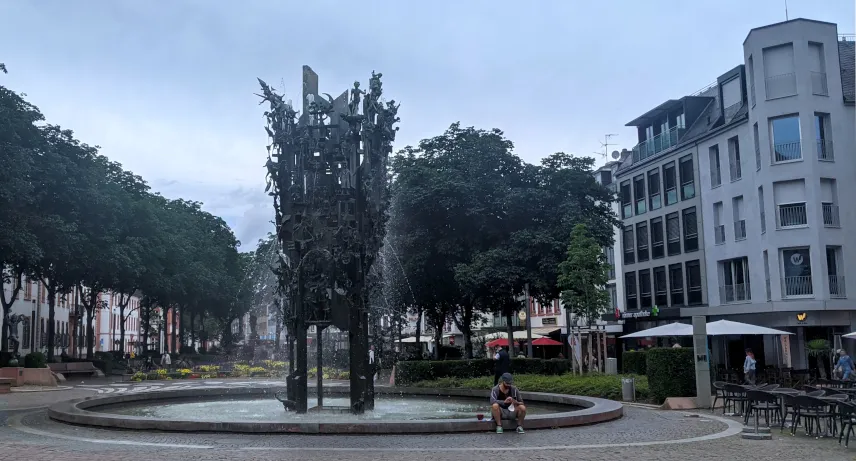
Rhineland-Palatinate food and drink
The Mainz equivalent to Handkäs is the Spundekäs, cream cheese with curd, seasoned with pepper, salt and paprika powder as well as onions.
My favourite dish in this area is the Saumagen or sow's stomach. It is literally a pig's stomach filled with sausage meat and other goodies like chestnuts, similar to sausages or the Scottish Haggis. While it doesn't sound too appealing, I find it unique and delicious.
Of course, wine is the drink of choice in Mainz, as it's part of the wine region Rheinhessen. Different than in Wiesbaden, you cannot only find white wines like Silvaner, Müller-Thurgau, or Weißburgunder. Red wines like Dornfelder, Spätburgunder, and Blauer Portugieser are also delicious.
We had our dinner at the Weinhaus Ehrenfels right in the city centre and I must say the food and service were amazing. For after-dinner drinks we went to the Zenz Wirtshaus, where we had a typical Mainzer Schoppe, a huge glass of white wine spritzer.
